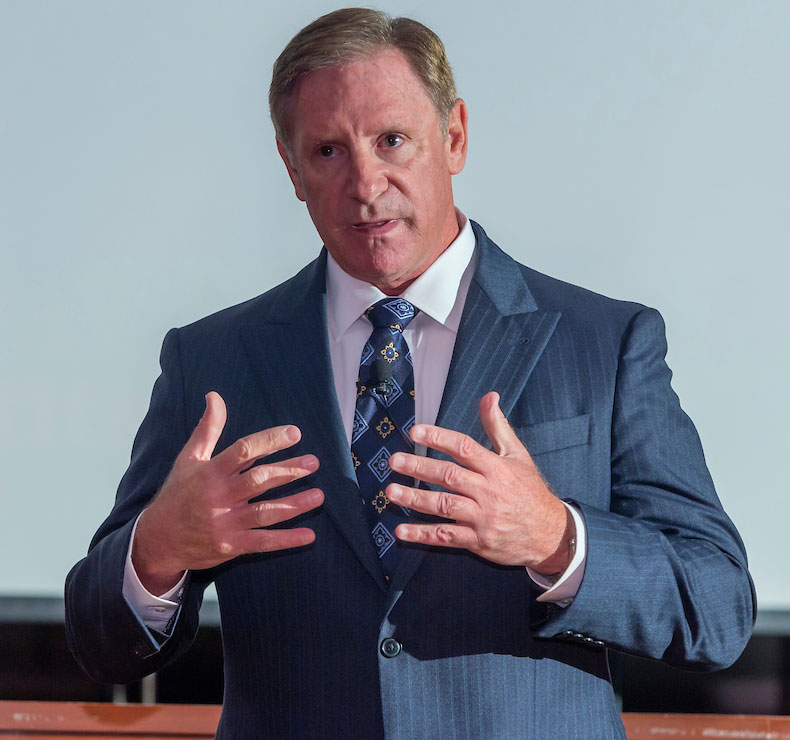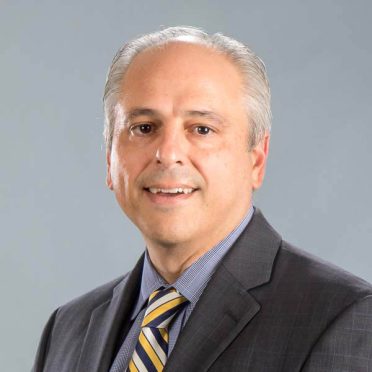As a California Highway Patrol Officer, Sgt. Kevin Briggs worked on the Golden Gate Bridge in San Francisco, often with suicidal people, but his own struggles with depression made his presentation Sept. 13 even more impactful at the seventh annual World Suicide Prevention Conference at Heublein Hall at Hartford Hospital.
Briggs, shown above, said when he first started his job as a highway patrol officer, he was not trained in suicide prevention. He had been in the military and had worked as a corrections officer before becoming a police officer. But his patrol area included the Golden Gate Bridge, so he encountered people who came to the bridge to end their lives.
He stressed the importance of listening to people, showing empathy and making eye contact. He said he would engage people by getting down to their level physically, rather than standing over them. He would try to talk to people between the barriers of the bridge.
He became known as the “Guardian of the Golden Gate Bridge” for encouraging more than 200 people to start a new chapter in their lives. He said sometimes he would talk to people for more than an hour, learning about their lives and their struggles.
“We are losing a lot of young people to suicide,” he said, “More than 1,110 college students commit suicide a year,” he said. Briggs now travels nationwide to college campuses, police stations and community groups to speak about suicide prevention and train others in crisis management and negotiations.
Hartford HealthCare Behavioral Health Network Physician-in-Chief John Santopietro said suicide is the second-leading cause of death in people ages 10 to 34 in the United States.
“It is a grim statistic, but also an incredible opportunity,” he said.
He encouraged everyone in the audience to ask themselves, “What role do I have to play in suicide prevention?”
Briggs himself went through some tough life experiences, such as being diagnosed with cancer, losing his mother to cancer, suffering a traumatic brain injury after a motorcycle accident and divorce. He didn’t realize he was suffering from depression, which he said hit him the worst.
He said shame and stigma, denial, avoidance and lack of vulnerability all play roles in why people don’t seek help and counseling.
He encouraged people to think about what type of listener they are when working with at-risk populations.
Are you:
- Competitive: Tell them your story instead of really listening to their story.
- Passive: Not responding or paying attention.
- Active: Use minimal words of encouragement, such as “really,” “wow” or “is that right?” to encourage them to keep talking.
This is the best type of listener.
Briggs said he uses an 80/20 rule, listening 80 percent of the time and only talking 20 percent. Also, it is important to show empathy by not being behind a desk or having a barrier between you and the other person.
It’s important to use a system to follow up, such as the Zero Suicide initiative now in place at Hartford HealthCare, that includes reaching out proactively when people are transitioning in care or miss an appointment. Zero Suicide is a philosophy of care and a set of tools, supported by the Action Alliance and the Substance Abuse and Mental Health Services Administration (SAMHSA) to help healthcare systems reduce suicide by people in care.
Usually Briggs wouldn’t see those he helped on the bridge again, as that wasn’t his role as a police officer, but he said he did connect later with one man. When he asked him what he did that helped, the man said he listened to him and that was what helped.
“The power of listening and being there for someone, that’s what this is all about,” Briggs said.
For more information on mental health services offered at the Institute of Living, click here.


